- Home
- Elizabeth Goudge
The Little White Horse Page 3
The Little White Horse Read online
Page 3
Miss Heliotrope, who had thought that perhaps she would have to sleep on a straw pallet on a rush-strewn floor, gave a gasp of relief upon seeing her room. It was a fair-sized room, and its oak floor was almost entirely covered by a crimson carpet. It was a very shabby carpet with large holes in it, but it was a carpet and not rushes.
There was a big four-poster with a flight of steps leading up to it, and crimson velvet curtains to keep the draught out. There was a bow-fronted mahogany chest of drawers, a huge mahogany wardrobe, a dressing-table with a chintz petticoat, and a winged armchair with a foot-stool for her feet. The stone walls had been panelled in warm dark wood, and the window was closely shuttered, with chintz curtains covering the shutters. All the curtains needed mending, but the furniture was well polished and it was all scrupulously clean.
And someone, it seemed, had been giving much thought to her comfort, for a log fire was burning brightly on the hearth, candles were burning on the chest of drawers and the dressing-table, and there was a warming-pan between the sheets. And their luggage was already here, piled neatly at the foot of the four-poster.
But Maria did not linger in Miss Heliotrope’s room. She waited only to see that she was happy, and then she went quietly off with her candle and pursued her way up the turret stairs, up and up and round and round for quite a long way. A room of her own! She had never had a room of her own before. She had always slept with Miss Heliotrope and, loving her as she did, she had not minded that; but yet, just lately, she had thought it would be nice to have a room of her own.
3
The turret stairs ended at a door so small that a large grown-up could not possibly have got through it. But for a slim girl of thirteen it was exactly right. Maria stopped and gazed at it with a beating heart, for though this little, narrow, low door was obviously hundreds of years old, yet she felt as though it had been made especially for her. For if she had been able to choose her own door, this was the door she would have chosen. It was more like a front door than a bedroom door, like the door of her very own house. It was of silvery grey oak studded with silver nails, and it had a knocker made of the smallest, daintiest horseshoe Maria had ever seen, polished so brightly that it shone like silver. At sight of it Maria thought instantly of the lovely little white horse she had thought she had seen in the park and that she had pointed out to Miss Heliotrope . . . only Miss Heliotrope hadn’t been able to see it . . . The door was opened by a silver latch that clicked in a friendly sort of way, when Maria lifted it, as though it was welcoming her.
She went in, latched the door behind her, put her candle carefully down on the floor, leaned back against the door and gazed and gazed, with her lips parted and her usually pale face glowing like a pink rose, and her eyes like stars.
No pen could possibly do justice to the exquisite charm and beauty of Maria’s room. It was at the top of the tower, and the tower was a round one, so Maria’s room was circular, neither too large nor too small, just the right size for a girl of thirteen. It had three windows, two narrow lancet windows and one large one with a window-seat in the thickness of the wall. The curtains had not been drawn across the windows, and through them she could see the stars. In each of the windows stood beautiful silver branched candlesticks with three lighted candles burning in each of them.
It was the light from one of these, Maria realized, that she had seen from outside shining through the branches of the cedar-tree. The walls had not been panelled with wood, as in Miss Heliotrope’s room, but the silver-grey stone was so lovely that Maria was glad. The ceiling was vaulted, and delicate ribbings of stone curved over Maria’s head like the branches of a tree, meeting at the highest point of the ceiling in a carved representation of a sickle moon surrounded by stars.
There was no carpet upon the silvery-oak floor, but a little white sheepskin lay beside the bed, so that Maria’s bare toes should meet something warm and soft when they went floorwards of a morning. The bed was a little four-poster, hung with pale-blue silk curtains embroidered with silver stars, of the same material as the window curtains, and spread with a patchwork quilt made of exquisite squares of velvet and silk of all colours of the rainbow, gay and lovely.
There was very little furniture in the room, just a couple of silvery-oak chests for Maria’s clothes, a small round mirror hung upon the wall above one of them, and a stool with a silver ewer and basin upon it. But Maria felt that she wanted no more than this. Heavy furniture such as Miss Heliotrope had, would have ruined this exquisite little room. Nor did she mind that the fireplace was the tiniest she had ever seen, deeply recessed in the wall. It was big enough for the fire of pine-cones and apple wood that burned in it, filling the room with fragrance.
But when Maria started to explore her room she found that it was not without luxuries. Over the fireplace was a shelf, and on it stood a blue wooden box filled with dainty biscuits with sugar flowers on them, in case she should feel hungry between meals. And beside the fireplace stood a big basket filled with more logs and pine-cones — enough to keep her fire burning all through the night.
It was all perfect. It was the room Maria would have designed for herself if she had had the knowledge and skill. For she realized that very much knowledge and skill had gone to the making of this room. Fine craftsmen had carved the moon and stars and fashioned the furniture, and an exquisite needlewoman had made the patchwork quilt and embroidered the curtains.
This way and that she stepped, putting her pelisse and bonnet and muff away in one of the chests, smoothing her hair before the mirror, washing her hands in the water that she poured out of the little silver ewer into the silver basin, touching all the beautiful things with the tips of her fingers, as though caressing them, saying thank you in her heart to the people who had made them, and whoever it was who had arranged them. Was it Sir Benjamin? But it couldn’t have been, because he couldn’t have got through the door.
A knock on the door, and the startled voice of Miss Heliotrope outside, reminded her that her governess, with her height and her hoop, would not be able to get through the door either, and in spite of her love for Miss Hellotrope she felt a little thrill of glee . . . This room was indeed her own . . . When she opened the door there was a mischievous dimple in her left cheek that had never been there before.
‘My dear! My dear!’ lamented Miss Heliotrope, who had now removed her outdoor garments and was wearing her mob-cap and her black shawl folded across her chest, ‘what a ridiculous little door! I shall never be able to get inside your room!’
‘No!’ giggled Maria.
‘But what shall we do when you’re ill?’ asked poor Miss Heliotrope.
‘I shan’t be ill,’ said Maria. ‘Not here!’
‘I certainly think that the air here is salubrious,’ agreed Miss Heliotrope, and then her eyes fell upon the inside of Maria’s room and widened with horror. ‘What an extraordinary little place! So very odd! Oh, my poor darling Maria! However are you to sleep in a place like this? It’ll give you the creeps!’
‘I like it,’ said Maria.
And Miss Heliotrope, looking at Maria’s rosy cheeks and sparkling eyes and that entirely new dimple, could not doubt that she spoke the truth. And looking again, more attentively, at the extraordinary little room, she saw that it suited Maria. Standing there so slender and straight in her grey dress, her room seemed to curve itself about her like the petals of a flower about its heart; they completed each other.
‘Well, well!’ said Miss Heliotrope. ‘So long as you are happy, my dear. And now, I think, we should go down to supper.’
Carrying their candles, and with Wiggins following them, they made their way down the winding staircase again.
‘I wonder,’ said Miss Heliotrope, ‘who does the work of this house? I have seen no sign of a maidservant, and yet everything is scrupulously neat and clean. A darning needle is wanted everywhere, as no doubt you have observed, but apart from that I have no fault at all to find, so far, with the household staff . . . But where
are they?’
‘Perhaps they’ll wait on us at supper,’ said Maria.
4
But no one waited on them. They waited on themselves. The supper was delicious. There was home-made crusty bread, hot onion soup, delicious rabbit stew, baked apples in a silver dish, honey, butter the colour of marigolds, a big blue jug of warm mulled claret, and hot roasted chestnuts folded in a napkin.
Miss Heliotrope confined herself to eating bread and butter and sipping a little claret, but she did it with an appetite that surprised her. Maria ate everything there was to eat, very daintily, as was her habit, but with an enjoyment surprising in one so ethereal-looking. Her cousin greeted her good appetite with a chuckle of appreciation. ‘A digestion of cast iron, like all the Merryweathers,’ he noted with approval. ‘Your little dog, also, I note, is a good trencherman.’
Wiggins had been provided with a plateful of stew, and was doing full justice to it. He was sharing the hearth with Wrolf, if not with any show of friendship yet with no enmity now. He and Wrolf, it seemed, had decided simply to ignore each other . . . And the huge hearth was quite wide enough for them both.
‘I have always heard that West Country women are wonderful cooks?’ said Miss Heliotrope with a faintly questioning tone.
‘You and Maria are the first members of the fair sex to set foot in this house for twenty years,’ Sir Benjamin informed her.
‘But why, Sir?’ asked Maria, her silver spoon arrested in mid-air. ‘Don’t you like females?’
‘Not as a general rule,’ said Sir Benjamin. Then he bowed very gallantly, first to Miss Heliotrope and then to Maria. ‘But there is always something particularly delightful about exceptions to a rule,’ he said.
He spoke with such sincerity that neither Miss Heliotrope nor Maria felt any sinking of the heart at the thought that they had come to live in an anti-feminine bachelor household. Yet they looked at each other in stupefaction. It was hard to believe any mere male capable of such superb soup and such a princely stew.
But they asked no more questions, because at this point Wiggins created a diversion. Overcome by greediness, he splashed a bit, and a small piece of carrot shot out of his dish and landed upon Wrolf’s nose. The indignity was too much for Wrolf. Outraged, he arose, and slowly and with measured gait left the room, lifting the latch of the front door with his nose. So majestic was his exit, so incomparable his dignity, that it was not so much an exit as a royal progress that compelled all eyes.
There was a momentary cessation both of conversation and mastication as he departed, and for the first time Maria got a real good look at the whole of him. A dog? Whatever Sir Benjamin might say, she could not believe that he was a dog. She had never seen a dog with such a huge head and massive chest, so strangely combined with such a slender waist; or such a glorious flowing sable mane. His tail, too, with that queer tuft of hair at the end of it, was not like a dog’s, nor his gait, nor —
‘Are you a good horsewoman, Maria?’ asked Sir Benjamin abruptly, and in duty bound she turned her attention back to her host.
‘I love horses, but I have not been taught to ride, Sir,’ she said.
‘Not been taught to ride!’ ejaculated Sir Benjamin in horror. ‘Whatever was your father thinking of? No Merryweather, male or female, is ever really happy out of the saddle.’
‘My father was so little at home,’ explained Maria.
‘Maria has no habit,’ Miss Heliotrope put in anxiously; for the thought of her precious Maria galloping about on horseback terrified her.
‘That is not of importance,’ said Sir Benjamin cheerfully. ‘What is of importance is that I have a pony just the right size for her.’
Maria’s pale face flushed again and her eyes sparkled. ‘The white one?’ she asked with quite extraordinary eagerness.
Sir Benjamin looked startled. ‘White? No. Dapple grey. Had you especially set your heart on a white mount?’
‘No-o,’ said Maria, not quite truthfully. ‘Only — I thought I saw a little white horse in the park as we drove through.’
If she had startled her relative before, she had now dumbfounded him. He set down his wineglass rather suddenly, spilling a little of the beautiful claret, and gazed at her with the queerest expression on his face, a mixture of astonishment, relief, and profound tenderness that made Maria feel quite queer. She was glad when he stopped staring at her, drained his glass and got up.
‘Two such weary travellers — three if we include the little dog — must be longing for their beds,’ he said.
They had been abruptly dismissed, Miss Heliotrope and Maria realized, yet they went bedwards with no sense of outrage, for a little oddness of behaviour was only to be expected in a man who had been for twenty years bereft of the civilizing influence of female companionship . . . Also he had been startled.
‘You must be careful not to startle him, my dear,’ said Miss Heliotrope, as they once more mounted the steps of their tower, with their candles in their hands and Wiggins pattering behind. ‘He is a man of considerable age and full habit, and perpetual shocks to his system will do him no good at all.’
‘But I didn’t mean to startle him,’ said Maria. ‘I only said I’d seen —’
‘You see very odd things,’ Miss Heliotrope interrupted her. ‘I myself have been considerably startled, at times, by the things you’ve seen and that I couldn’t see. There was the time you saw the cuckoo fly out of the cuckoo-clock and sit on top of it and preen his feathers, and that peculiar imaginary playmate of yours that you made up for yourself when you were only a little thing, that boy with the feather in his hat who used to play with you in the Square garden.’
‘But he wasn’t imaginary,’ said Maria hotly. ‘He was a real boy. He is a real boy. I know he’s alive somewhere still, even though he does not come to play with me any more. His name is Robin, and he looks like a robin, with bright dark eyes and rosy cheeks and —’
‘My dear,’ interrupted Miss Heliotrope again, somewhat sternly, ‘you have told me a thousand times what he looks like, or what you imagined at the time that he looked like, and I can only repeat that there was, and is, no such person.’
Maria said no more, because she did not want to quarrel with Miss Heliotrope. The only subject upon which she and her governess had ever really disagreed with any heat was this subject of the existence or non-existence of Robin. Miss Heliotrope had been deeply distressed at Maria’s inability to draw the line between fiction and fact, and Maria had been equally distressed because her word was doubted; for Maria was very truthful, and when she said a thing was so nothing distressed her more than to hear people say it wasn’t.
At the little door with the silver knocker Miss Heliotrope and Maria kissed each other good night affectionately, the tiny momentary rift between them quite forgotten.
‘You’d better have Wiggins at night,’ said Maria. ‘And then if any mice come he can chase them away.’
But Wiggins thought differently. Through the open door he had caught sight of the little four-poster with the patchwork counterpane, and it struck him that it was a much softer bed than Miss Heliotrope’s . . . Also he thought he could smell biscuits . . . He trotted in, took a flying leap, and landed on the bed.
‘Now isn’t that touching!’ said Miss Heliotrope, tears of sensibility coming into her eyes. ‘He knows that you are his little mistress. He feels that he must guard you now that you are to sleep by yourself for the first time.’
Wiggins, curled up on the bed, wagged his plume of a tail, and his beautiful eyes shone softly in the candlelight.
‘Oh, my Wiggins, aren’t you sweet!’ cried Maria, running to kiss him after Miss Heliotrope had shut the door and gone away. ‘Such a loving, devoted little Wiggins. You shall have a biscuit, Wiggins. You shall have the largest of the sugar biscuits.’
Maria, fetching Wiggins the largest biscuit, the round one with the pink sugar rose on top, noticed that the fire had been made up afresh, the silver ewer had been filled with hot wate
r, and that a glass of milk had been put on the shelf beside the biscuit-box. Now who had done that? Not the old coachman, surely. He was little enough to get in through the small door, perhaps, but there seemed no way to get to her room except through the hall, and she had not seen him pass through while they were at supper.
Well, whoever it was, it gave her a lovely warm happy feeling to find herself so cared for. As she undressed, she sipped the milk, and it was warm and sweet, just as she liked it. And the sugar biscuit that she ate with it, a long-shaped one decorated with a green shamrock, was delicious too. So life in the country was not going to be so comfortless, after all. That ramshackle carriage had been quite misleading.
She undressed, washed, put on her long white nightgown and her white nightcap with the lace frills, blew out the candles, and climbed into bed. One of the windows was open, and the night air that blew in was not cold but fresh and sweet. Her mattress, she found, was stuffed with the softest feathers, and her sheets and pillow-cases were of the finest linen and smelt of lavender. Earlier in the evening there must have been a warming-pan in her bed as well as Miss Heliotrope’s, because it felt lovely and warm when she put her toes down. It was a lovely bed, and with sighs of content she and Wiggins crunched up the last crumbs of their sugar biscuits and snuggled themselves down for repose.
Wiggins was deeply asleep at once, but Maria lay for some time between sleeping and waking, thinking of the beautiful park through which she had driven to this lovely house and imagining herself running up one of its glades. And then her fancy became a dream and she was in the park, with the scent of flowers about her and spring trees talking to each other over her head.
But in her dream she was not alone, Robin was with her, running beside her and laughing. And he was just the same — just as he had been when in her childhood she had been sent to play in the Square garden, and had felt lonely, and he had come running through the trees to companion her loneliness. He was just exactly her age — or perhaps a little older, because he was a head taller than she, and much broader.

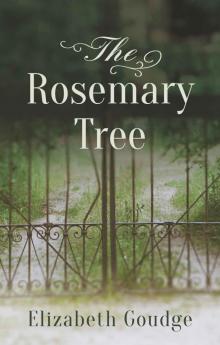 The Rosemary Tree
The Rosemary Tree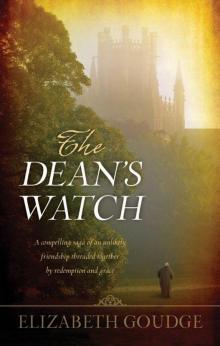 The Dean's Watch
The Dean's Watch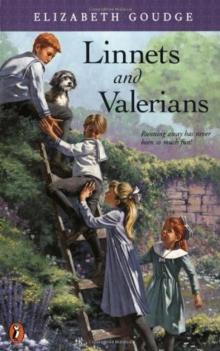 Linnets and Valerians
Linnets and Valerians Gentian Hill
Gentian Hill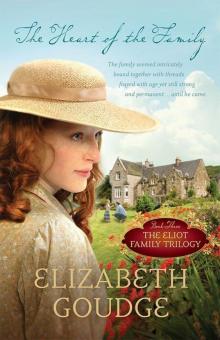 B00DRI1ZYC EBOK
B00DRI1ZYC EBOK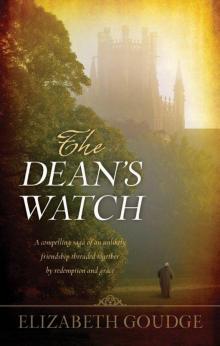 B008O6ZWTG EBOK
B008O6ZWTG EBOK The Scent of Water
The Scent of Water Pilgtim's Inn
Pilgtim's Inn Island Magic
Island Magic Pilgrim's Inn
Pilgrim's Inn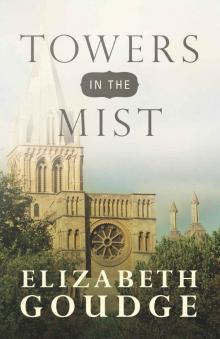 Towers in the Mist
Towers in the Mist Green Dolphin Street
Green Dolphin Street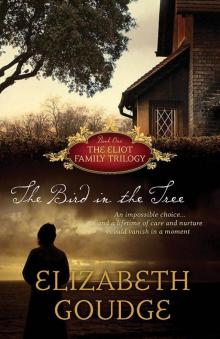 The Bird in the Tree
The Bird in the Tree The Child From the Sea
The Child From the Sea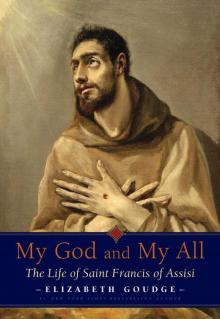 My God and My All: The Life of Saint Francis of Assisi
My God and My All: The Life of Saint Francis of Assisi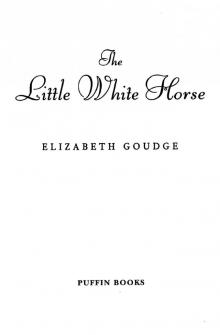 The Little White Horse
The Little White Horse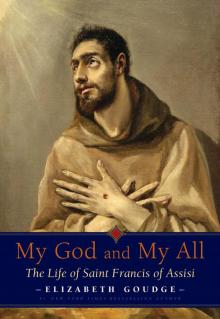 My God and My All
My God and My All B00CKXCNH8 EBOK
B00CKXCNH8 EBOK